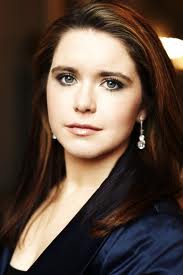|
Symphony
FROM THE NEW WORLD TO THE OLD WORLD
by Peter Lert
Saturday, June 14, 2025
Chamber
MC2 DUO RECITAL CLOSES 222'S SEASON
by Terry McNeill
Saturday, June 14, 2025
Choral and Vocal
CANTIAMO SONOMA'S LUSCIOUS A CAPELLA SINGING IN SEASON ENDING CONCERT
by Pamela Hicks Gailey
Sunday, June 8, 2025
Symphony
SRS SEASON ENDS WITH RESOUNDING TA-TA-TA-BANG
by Terry McNeill
Sunday, June 1, 2025
Symphony
YOUTHFUL VIRTUOSITY ON DISPLAY AT USO'S MAY CONCERTS
by Peter Lert
Saturday, May 17, 2025
Symphony
MYSTICAL PLANETS AND LIVELY GERSHWIN ORTIZ AT FINAL SRS CONCERT
by Peter Lert
Sunday, May 4, 2025
Symphony
VSO'S CONCERT MUSIC OF TIME, MUSIC OF PLACE
by Peter Lert
Sunday, April 27, 2025
VOCAL ELEGANCE AND FIRE AT THE 222'S RECITAL APRIL 26
by Pamela Hicks Gailey
Saturday, April 26, 2025
CANTIAMO SONOMA SINGS AN INSPIRED GOOD FRIDAY MOZART REQUIEM CONCERT
by Pamela Hicks Gailey
Friday, April 18, 2025
DRAMATIC SHOSTAKOVICH SYMPHONY CLOSES PHILHARMONIC'S 25TH SEASON
by Terry McNeill
Sunday, April 13, 2025
|
 |
 Mezzo Soprano Tara Erraught |
MESMERIZING IRISH MEZZO TELLS STORIES IN WEILL SONG RECITAL
by Vaida Falconbridge
Sunday, April 21, 2013
There were stories of fiery gypsies, dances, kisses, deep angst, unrequited love, mermaids, and headstrong young maidens. Irish-born mezzo soprano Tara Erraught told her Weill Hall audience April 21 in her lilting Irish brogue, “People ask why I pick the programs the way I do. Well, being from Ireland, one has to be a storyteller. So I’ve chosen these songs because I love these stories!” And tell them convincingly she did, with a stunning vocal instrument, wonderfully animated facial expressions, sparkling eyes, beaming smiles, and total commitment to the text.
Dvorak is best known for his symphonic works and concerti, but he wrote songs with piano throughout his life. Although some were composed in German, because of his nationalistic bent he generally preferred Czech folk lyrics and rustic Slavic poetry. His Vier Lieder, or Four Songs (Op. 82) opened the program and was a homage to Schubert.
The songs were varied in mood and tempo, offering a mostly positive first impression of Ms. Erraught’s artistry, tonal palette, and diction. She has an exciting and excellent top, but the low range not as substantial as expected for a mezzo, at least in this group (the Rossini and Handel later in the program were very well-balanced), and she has great facility and ease with the German language. This was more than confirmed with the outstanding Brahms “Gypsy Songs” and Wolf “Morike Lieder” later in the program.
Mostly remembered for his Roman tone poems, songs by Respighi are not often heard on recitals, although he wrote beautifully for the voice and was married to the singer Elsa Olivieri-Sangiacomo. Of the three Respighi selections performed by Ms. Erraught, “Nebbie” (Fog) is probably the best known, due to the highly memorable and haunting descending/ascending melodic pattern. It was elegantly sung.
The first half ended with Brahms’ “Gypsy Songs.” Op 103. With 11 songs in the set, they were originally written in 1887-1888 for a quartet of voices and piano; Brahms arranged Nos. 1 to 7 and 11 for solo voice and piano in 1889, and these eight were sung by Ms. Erraught with brilliance of tone, vibrant shimmering high notes, and exciting dynamic contrasts.
Coming back for the second half wearing a royal blue Grecian-style gown, Ms. Erraught sang six of Wolf’s “Morike Lieder.” Wolf, whose greatest musical influence was Wagner, was best known for his lieder, and his temperament and sensitive poetic discernment lead him to more intimate and subjective musical forms. Again, in singing a group with wide demands in terms of range, color and dynamics, I heard in Ms. Erraught an accomplished, elegant, tasteful, and perceptive performer. One minor quibble: in some slower and soft passages the “oh” and “ah” vowels were at times too far back, resulting in a slightly throaty spread quality that affected the vibrato on the sustained last notes of certain phrases and thus lost intensity in her portrayal of the text .
Saving the best for last in Handel and Rossini arias the singer, as they say, knocked it out of the park. “Dopo notte,” from Ariodante, could not have been a bigger contrast from the Wolf miniatures. With jaw-dropping agility and speed, loads of clean, accurate trills, impressive evenness of scale from top to bottom (and back up again and again and again), it was a total showpiece. “Lascia ch’io pianga” from Rinaldo featured a lovely legato and a nicely-ornamented da capo section.
“Una voce poco fa” from Rossini’s Barbiere di Siviglia is sometimes considered a ‘warhorse,’ but it’s always an aria where a singer can prove her bonafides and bid to be added to the list of greats who have gone before. There’s no doubt, Tara Erraught is fast. Furiously fast. Think Cecilia Bartoli-fast. At that point, the audience was more than ready to express their appreciation with a standing ovation, which earned them the pleasure of two encores.
“It would be wrong to come all the way from Ireland and not sing ‘Danny Boy,’ “ she told us, and then sang it so poignantly and gorgeously you could have heard the proverbial pin drop in the hall. The second encore was yet another barnburner, “Non piu mesta” from Rossini’s La Cenerentola (Cinderella), with two-octave-plus runs and trills galore at breakneck speed, again performed fearlessly and flawlessly.
It would also be wrong not to acknowledge the superb pianist Jonathan Ware in his first collaboration with Ms. Erraught. She shared from the stage, “We’ve had a ball in rehearsals, so I hope that’s coming through this afternoon.” It did indeed.
|
